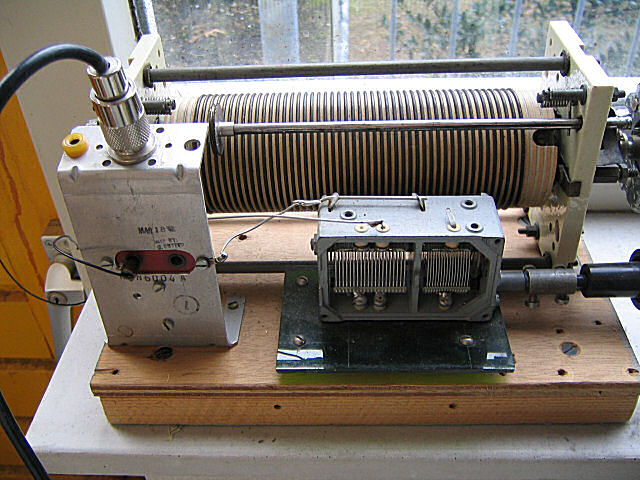Geen Daily Minutes op maandag 26 maart 2018
Ik had wat hoofdpijn, en ik ben eind van de middag een half uurtje gaan slapen. Dat half uurtje werd ongepland iets langer: 10 minuten voor zeven werd ik wakker.
Morgen is er gewoon weer een uitzending 🙂
Serie over zelfbouw, voorjaar 2018
Deel 1:
Deel 2:
Deel 3:
Deel 4:
Deel 5:
Antennetuner uit de serie zelfbouw afl. 5 (25/3)

Het fietslampje zit achter het alu-plaatje, en kan met een bananenstekker worden overbrugd door de (gedeeltelijk ontmantelde) bananenstekker van het rechter- naar het linkergaatje over te steken.
Het draadje uit de bananenstekker gaat naar de antenne, de coax aan de Amphenol-connecter gaat naar de zendontvanger.
Daily Minutes 25 maart 2018
“It’s not real Ham Radio!” by Chris G7DDN
A Pioneering Background
I was musing recently on the wonderful history of Amateur Radio, from the early pioneers with spark transmitters and the race to get the first signals across the Atlantic, up to the Microwave enthusiasts who developed the way forward for space communications and satellite technology (and, whisper this, mobile phone technology!)
The history of Ham Radio and RF technology is inextricably linked – there was even a time here in the UK where it was believed, anecdotally, that a Ham Radio callsign would help you to get a job with the BBC!
However change came very quickly, relatively speaking, in the early history of radio. From Marconi’s experiments to the first Public Broadcast Stations was only 25 or so years. TV was only another 15 years or so behind that, and so on…
Resistance (or not feeling at “Ohm”)
Yet the history of Ham Radio is also one of resistance to change – not from the pioneers, they were often instigators of it, but from the “everyday” Hams.
Let me see if I can give you some examples, with my tongue planted very firmly in my cheek…
“That’s not Real Ham Radio!”
The early Hams used CW pretty much exclusively. So when AM arrived as one of the first of the voice modes, there was a bit of an uproar…“It’s not real Ham Radio! Real Ham Radio involves using a Morse Key! What in world is the hobby coming to, using voice to communicate over the airwaves? It’s sacrilege!”
Daily Minutes 24 maart 2018
Wekelijkse PA00NEWS-uitzending op PI3UTR, 23 maart 2018
Daily Minutes 23 maart 2018
Daily Minutes 22 maart 2018
Daily Minutes 21 maart 2018
Daily Minutes 20 maart 2018
Daily Minutes 19 maart 2018
Daily Minutes 18 maart 2018
Daily Minutes 17 maart 2018
* * * Nieuwe ingang PI3XDV op 50,570 MHz * * *
Sinds vanmiddag (zaterdagmiddag 17/3) heeft PI3XDV een nieuwe ingangsfrequentie op 50,570 MHz erbij. Dit is een frequentie in het bandplan voor simplex-links naar internet.
De actuele frequenties voor PI3XDV zijn op dit moment:
144,875 MHz, uitgangsfrequentie
144,875 MHz tevens ingangsfrequentie (alleen naar EchoLink)
70,350 MHz ingangsfrequentie, relayeert naar 144,875 MHz
50,570 MHz ingangsfrequentie, relayeert naar 144,875 MHz
Polarisatie van beide is momenteel horizontaal. De antenne is beter dan de antenne die tot nu toe voor 70,350 MHz gebruikt werd.
Nog enkele opmerkingen:
- Momenteel is geen CTCSS nodig. Bij goede condities of veel storingen kan op elk van de ingangen eventueel 77 Hz ingeschakeld zijn.
- De uitgang heeft altijd 77 Hz ingeschakeld. Dit kan gebruikt worden als er ander verkeer op 144,875 plaatsvindt, zodat je alleen PI3XDV ontvangt.